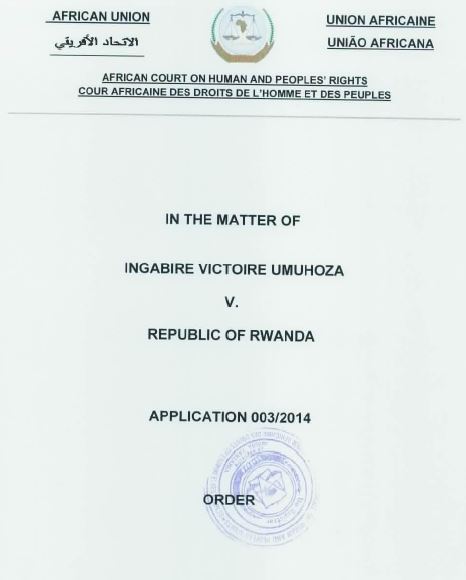
As regular Court followers will be aware, much ink has been spilled, or probably more accurately keyboards worn down – including at The Monitor– with last month’s news that Rwanda had withdrawn its Article 34(6) declaration which allows individuals and NGOs with AU observer status direct access to the Court (Special Declaration). For those new to the issue, news broke on the day the Court was due to hear the high-profile case of Victoire Ingabire that Rwanda had withdrawn its Special Declaration and the Ingabire case was therefore halted. Exactly how Rwanda had withdrawn and whether the Court was suspending or terminating matters was unclear. What is clear is that Rwanda’s move caused turmoil among Court observers, who have raised questions over whether Rwanda can actually withdraw, if it can then when such a withdrawal takes effect, what effect it has on other Rwandan cases, how the Court will handle the matter and what it means for the future of the Court.
As I have previously suggested, the crucial question in the fall out of this unprecedented development is how the Court will handle Rwanda’s move, with the answer likely in the form of a written judgement or order. Whilst we wait for this, on 18th March the Court issued an interim-type order which provides us with a little bit more information on the withdrawal and the Court’s approach to the issue. The Order is well worth reading in full (in its present state its 10 pages) and raises some interesting issues. Here are five points to consider:
(1) The Order confirms Ingabire’s efforts to adjourn the matter. The Order does not go into detail as to why, but it appears Ingabire’s adjournment request had little to do with Rwanda’s withdrawal of its Special Declaration and everything to do with problems preparing the case for hearing. Despite this seeming disconnect, the Court appears to use Ingabire’s request in its later determination to allow Ingabire to provide submissions on Rwanda’s withdrawal. Despite no link between Ingabire’s attempts to adjourn and the withdrawal of the Special Declaration, it is nevertheless interesting to note that Ingabire and her legal team will have the chance to present full submissi0ns on Rwanda’s withdrawal.
(2) We learn a little more about the nature of Rwanda’s “withdrawal”. And to my mind anyway, its a little confusing. The Order states that Rwanda notified the Court of “withdrawal of its Declaration made under Article 34(6)…”. The Order goes on to quote Rwanda’s withdrawal letter itself, and I re-quote it here:
“The Republic of Rwanda requests that after deposition of the same, the Court suspends hearings involving the Republic of Rwanda including the case referred above [Ingabire, presumably] until review is made to the [Special] Declaration and the Court is notified in due course”
What we therefore seem to have is not so much a “withdrawal” but a suspension of hearings until a “review”, presumably by Rwanda itself, is completed. The result of this review will be communicated to the Court. If this is correct, Rwanda seems to be asking the Court to suspend Rwandan cases until it has reviewed the Special Declaration and what it wants to do with it, rather than withdraw its Special Declaration. Yet the preceding wording very clearly uses the term “withdraw”. Is it possible to withdraw the Special Declaration pending review, akin to a temporary withdrawal? The Court may well have to answer this before addressing the affect of the withdrawal. In any event, since Rwanda must have “reviewed” the Special Declaration at the time it deposited (it cannot claim to have signed up without reading it and understanding what it means?) I suggest Rwanda will be reviewing how the Special Declaration has been used by applicants since it was deposited. It will be interesting to see if Rwanda does indeed attempt to withdraw after this review based on how, or rather who, used the access afforded by the Special Declaration rather than the notion of the Special Declaration itself. It is also worth noting that the Order does not state how long Rwanda needs for this review, perhaps because the Order does not seem to take much notice of this Rwanda’s pronouncement, instead setting out a time line for submissions without taking into consideration Rwanda reviewing the Special Declaration.
(3) We get a possible insight into Rwanda’s no-show at the public hearing. And again its rather confusing. Following Rwanda’s letter of withdrawal, the Court seems to have informed all parties that the public hearing would still go ahead on 4 March 2016. In response, on 3 March 2016, Rwanda stated, which is again quoted in the Order and which I again re-quote, the following:
“Without prejudice to the foregoing, I respectfully request the Hon. Court. if not granting the Respondent’s request made on 2nd March 2016 [the suspension of cases pending the review] to allow the Respondent being hearing on its request before a Court Order can be made”
This seems to be a request from Rwanda that if the Court will not suspend Rwandan cases as a result of its letter of withdrawal, that it be heard on the matter. But Rwanda did not turn up for the public hearing the very next day. Given that Rwanda seemingly had no way of knowing at the time of the public hearing whether the Court would grant its request in the withdrawal letter to suspend Rwandan cases, it seems strange that Rwanda would explicitly request an opportunity to address the Court, and then not turn up. What I previously described as a “gutsy” move by the Court to hold the public hearing knowing that Rwanda would not attend, becomes a little more confused in light of Rwanda’s request to be heard on the matter. Was the Court, based on the letter it received from Rwanda requesting a hearing, fully expecting Rwanda to be in attendance? Was Rwanda playing an enormous game of chicken, and if so did the Court know it was playing too?
(4) Everyone gets 15 days to file submissions. What is not known is how this time limit accords with Rwanda’s “review” of the Special Declaration or whether it will ask for more time. Given that Rwanda seemed to be asking for a hearing on the matter, is is possible Rwanda had already conducted this “review”? Either way, taking the date of the Order, 18th March, and counting working days only, all submissions should be filed by Friday 8th April.
(5) The Order was not unanimous. The Order states that Judge Ouguergouz and Judge Achour dissented, but the Order currently available from the Court is missing Judge Ouguergouz’s dissent (once I have this I will update this post). Judge Achour takes the position that the Court need not have issued this Order at all and that Rwanda’s withdrawal should be dealt with in the final judgement on the merits rather than in a separate decision. Judge Achour’s dissent also makes the point, as made here in my last post on the matter, that Rwanda responded to the application on the merits until right before the public hearing, indicating a possible change in tactic from compliance to withdrawal. There is also an interesting difference between Judge Achour’s dissent and the Order. In his dissent Judge Achour recalls the final judgement will be handed down at the Court’s 41st Ordinary session. Yet, the main order says only that the main judgement will be handed down “at a date to be duly notified to the Parties”. It appears that Judge Achour may be quoting a previous draft of the order, and that the final version stepped away from giving such a definitive timeline. Either way, the Court’s 41st Ordinary Session will be worth watching as a possible time for the rendering of the judgement.
In conclusion, this Order sheds some light on Rwanda’s withdrawal of its Special Declaration, but it does not provide a great deal of clarity, possibly even adding some confusion to the mix. Perhaps the somewhat confusing timeline and requests detailed in the Order are the reason why the Court has invited further submissions; an attempt to clarify exactly what Rwanda has done and what it wants to do, since at present the notions of “withdrawal” and “review” raised by Rwanda do not sit easily together. What the Order does not do is provide much indication on which way the Court is leaning on this matter. The final order remains eagerly awaited.
As always, the views expressed herein are those of the author(s) and do not necessarily reflect the views of the United Nations or any other organisations affiliated to the author(s).
